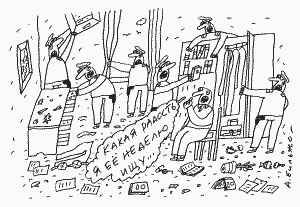Russia would very much like to join the World Trade Organization. Two countries currently stand in its way: The United States and Colombia. Well, one country, really. At least, that’s how President Putin sees it (as reported by Lenta.ru):
At the end of March Vladimir Putin, in his inimitable way, accused the US of artificially setting Russia back in discussions concerning its entry into the WTO. A few days later American officials, who could not remain indifferent to Putin’s declaration, published a long list of complaints against Russia.
In addition to Russian tariffs and trade barriers and other esoteric stuff (e.g., not allowing insurance companies and banks to set up affiliates in Russia), one complaint has to do with copyright infringement:
The US flatly says in the document that this is a key issue for the country’s entry into the WTO. According to trade experts, the United States loses as much as $1.7 billion annually as a result of illegal copying of music, videos, and software.
How much of that is happening in Russia, they don’t say. But it did make me wonder about a couple of Russian MP3 sites (AllOFMP3.com and MP3Search.Ru). One might assume they pay the copyright owners for each song downloaded, but how does one know? After all, we don’t really know that iTunes pays the artists for each download, do we? But we can reasonably assume Apple would get its butt sued off if it didn’t.
Back in the bad old days, the Soviet Union chose not to sign on to the Berne Convention, preferring the looser Universal Copyright Convention (which it signed on to in 1952). The new Russia signed on to Berne in 1995. The question is, does Russia actually protect foreign copyright holders? That is, do they allow foreign entities to litigate alleged infringement? If the US is raising a stink about it in the WTO talks, I would guess not.
The more local issue, of course, is: how much should Joe Consumer, law-abiding American, care? If he pays for an internet service he takes to be legitimate, is that enough? If not, how much research is he supposed to perform to legitimize the purchase of a handful of MP3s? AllOFMP3.com rewards the curious consumer with this (if you click on “Legal Info” and keep clicking):
Is it legal to download music from AllOFMP3.com?
The availability over the Internet of the ALLOFMP3.com materials is authorized by the license # LS-3М-05-03 of the Russian Multimedia and Internet Society (ROMS) and license # 006/3M-05 of the Rightholders Federation for Collective Copyright Management of Works Used Interactively (FAIR). In accordance to the licenses’ terms MediaServices pays license fees for all materials downloaded from the site subject to the Law of the Russian Federation “On Copyright and Related Rights”. All these materials are solely for personal use. Any further distribution, resale or broadcasting are prohibited.
The works available from ALLOFMP3.com are protected by the Law of the Russian Federation “On Copyright and Related Rights” and are for personal use of a buyer. Commercial use of such material is prohibited. Recording, copying, distribution on any media is possible only upon special consent of a Rightholder.
The user bears sole responsibility for any use and distribution of all materials received from AllOFMP3.com. This responsibility is dependent on the national legislation in each user’s country of residence. The Administration of AllOFMP3.com does not possess information on the laws of each particular country and is not responsible for the actions of foreign users.
Well, that certainly clears things up!
MP3Search.Ru has a similar notice, but includes a link to FAIR—in Russian, Федерация правообладателей по коллективному управлению Авторскими правами при использовании произведений в Интерактивном Режиме, hence the acronym. The FAIR home page includes a paragraph describing its dealings with foreign artists:
In accordance with the Law “On Copyright and Related Rights,” FAIR is obligated to act in the interests of all authors and rightholders, both Russian and foreign. FAIR acts under the authority of powers granted by the Law regardless of the existence or absence of a contract with each individual rightholder. …
It goes on to elaborate on the right of all rightholders (including those who have not entered into a contract with FAIR) to demand compensation for the distribution of their property. That’s a bit more comforting. I’m having a hard time picturing the process—who sets the rates of royalty payment and how; how rightholders are notified of the use of their works (or if they are); etc. Then again, I don’t know how ASCAP works. I think I’ve satisfied my curiosity for now.



